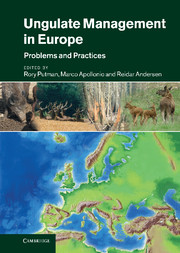Book contents
- Frontmatter
- Contents
- List of contributors
- Scientific names of species referred to in this text
- 1 Introduction
- 2 Status and distribution patterns of European ungulates: genetics, population history and conservation
- 3 A review of the various legal and administrative systems governing management of large herbivores in Europe
- 4 Hunting seasons in relation to biological breeding seasons and the implications for the control or regulation of ungulate populations
- 5 The census and management of populations of ungulates in Europe
- 6 Impacts of wild ungulates on vegetation: costs and benefits
- 7 Wild ungulate diseases and the risk for livestock and public health
- 8 Traffic collisions involving deer and other ungulates in Europe and available measures for mitigation
- 9 Large herbivores as ‘environmental engineers’
- 10 Ungulate–large carnivore relationships in Europe
- 11 The role of pathogens in the population dynamics of European ungulates
- 12 Climate change and implications for the future distribution and management of ungulates in Europe
- 13 Ungulate management in Europe: towards a sustainable future
- Index
- References
3 - A review of the various legal and administrative systems governing management of large herbivores in Europe
Published online by Cambridge University Press: 26 April 2011
- Frontmatter
- Contents
- List of contributors
- Scientific names of species referred to in this text
- 1 Introduction
- 2 Status and distribution patterns of European ungulates: genetics, population history and conservation
- 3 A review of the various legal and administrative systems governing management of large herbivores in Europe
- 4 Hunting seasons in relation to biological breeding seasons and the implications for the control or regulation of ungulate populations
- 5 The census and management of populations of ungulates in Europe
- 6 Impacts of wild ungulates on vegetation: costs and benefits
- 7 Wild ungulate diseases and the risk for livestock and public health
- 8 Traffic collisions involving deer and other ungulates in Europe and available measures for mitigation
- 9 Large herbivores as ‘environmental engineers’
- 10 Ungulate–large carnivore relationships in Europe
- 11 The role of pathogens in the population dynamics of European ungulates
- 12 Climate change and implications for the future distribution and management of ungulates in Europe
- 13 Ungulate management in Europe: towards a sustainable future
- Index
- References
Summary
This chapter attempts to review the legal constraints on hunting and game management in a range of different countries in Europe. It draws heavily on data presented in Apollonio et al. (2010) as a primary source – and focuses principally on the control of hunting of ungulates.
Different management systems in different countries largely reflect the legal status of game (whether they are considered to belong to the state, to the private landowner, to everyone, or to no one!) and cultural attitudes to hunting – which relate to the role that hunting plays within the wider culture of each country and the historical status of hunting in that country (reviewed briefly in Chapter 1). Within the legal framework established, the second part of this chapter thus considers the different administrative systems operating in different countries to regulate and control hunting.
General legislative framework
No attempt is made to list the relevant legislative instruments or regulations concerned with the management of game animals in the different countries within Europe – partly because in any one country, relevant regulations are contained in a large number of different laws on hunting, game management, conservation of wildlife, handling and sale of game meat, control of use of firearms, etc. There is an additional complication in the fact that in some countries, while a part of the legislation may be operative at national level, some elements of the legal provision are delegated to regulation at a provincial or regional level.
- Type
- Chapter
- Information
- Ungulate Management in EuropeProblems and Practices, pp. 54 - 79Publisher: Cambridge University PressPrint publication year: 2011
References
- 7
- Cited by



